CSR, Virtue Signalling and Banks: An Analysis of Tony Abbott's View
VerifiedAdded on 2023/06/08
|14
|3778
|439
Report
AI Summary
This report provides an analysis of Tony Abbott's statement regarding the CSR activities of the big four Australian banks, interpreting his comments as a critique of 'virtue signalling.' The report explores the context of Abbott's statement, defining virtue signalling and differentiating between narrow and broad views of CSR. Through a review of literature, it examines the significance of Abbott's perspective, considering arguments for and against CSR. Ultimately, the report supports Abbott's concerns while advocating for improved management of CSR activities by large corporations, emphasizing the importance of ethical conduct and customer relations alongside broader social responsibilities.
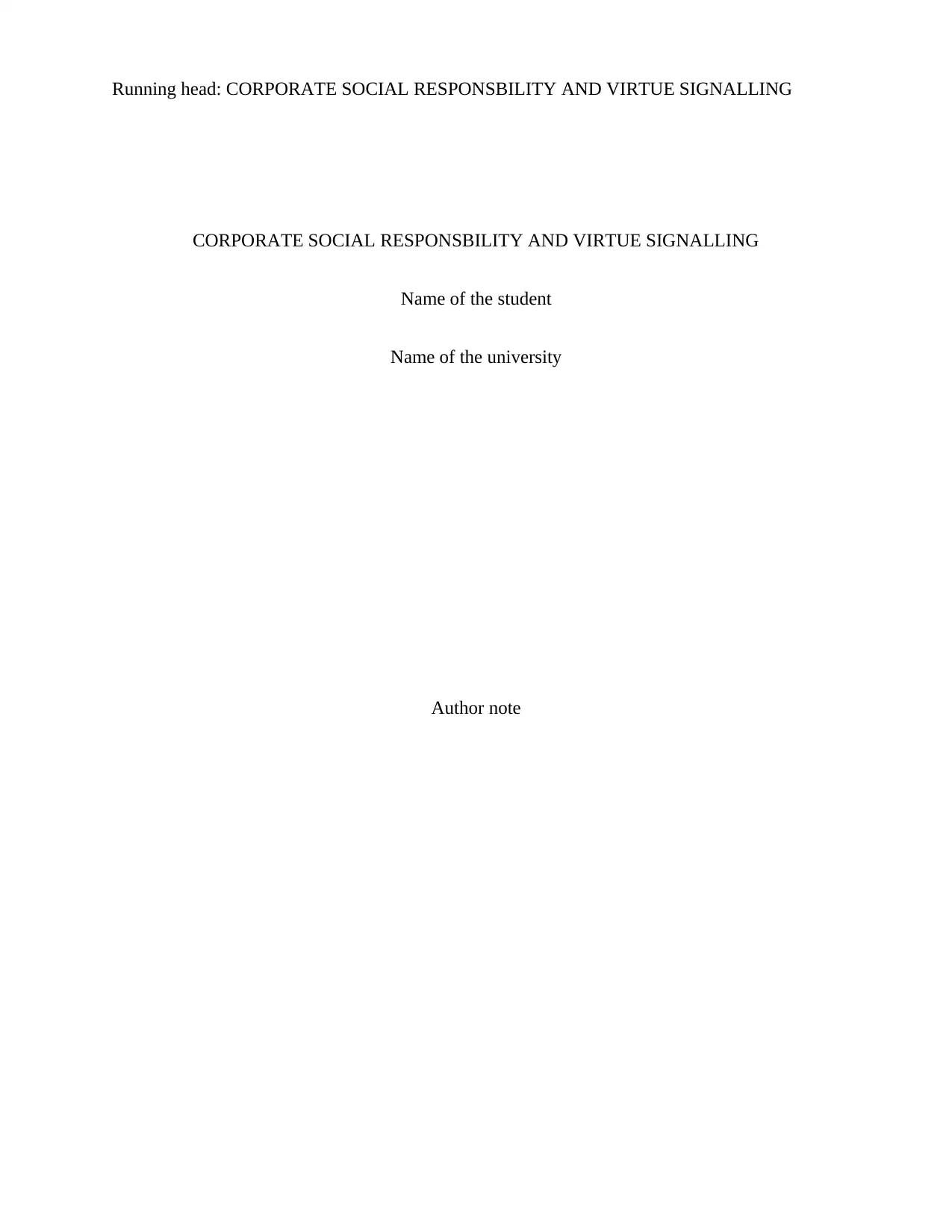
Running head: CORPORATE SOCIAL RESPONSBILITY AND VIRTUE SIGNALLING
CORPORATE SOCIAL RESPONSBILITY AND VIRTUE SIGNALLING
Name of the student
Name of the university
Author note
CORPORATE SOCIAL RESPONSBILITY AND VIRTUE SIGNALLING
Name of the student
Name of the university
Author note
Paraphrase This Document
Need a fresh take? Get an instant paraphrase of this document with our AI Paraphraser
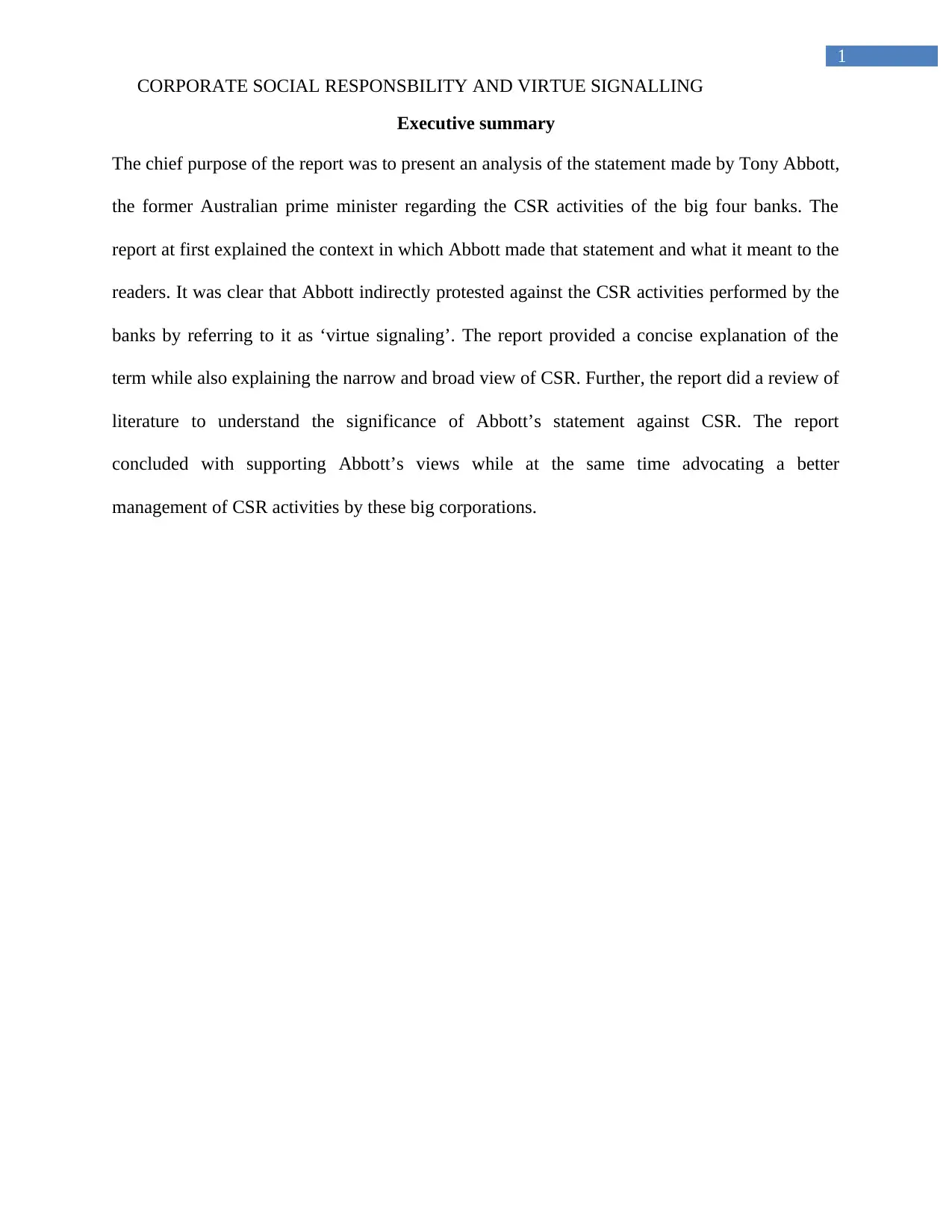
1
CORPORATE SOCIAL RESPONSBILITY AND VIRTUE SIGNALLING
Executive summary
The chief purpose of the report was to present an analysis of the statement made by Tony Abbott,
the former Australian prime minister regarding the CSR activities of the big four banks. The
report at first explained the context in which Abbott made that statement and what it meant to the
readers. It was clear that Abbott indirectly protested against the CSR activities performed by the
banks by referring to it as ‘virtue signaling’. The report provided a concise explanation of the
term while also explaining the narrow and broad view of CSR. Further, the report did a review of
literature to understand the significance of Abbott’s statement against CSR. The report
concluded with supporting Abbott’s views while at the same time advocating a better
management of CSR activities by these big corporations.
CORPORATE SOCIAL RESPONSBILITY AND VIRTUE SIGNALLING
Executive summary
The chief purpose of the report was to present an analysis of the statement made by Tony Abbott,
the former Australian prime minister regarding the CSR activities of the big four banks. The
report at first explained the context in which Abbott made that statement and what it meant to the
readers. It was clear that Abbott indirectly protested against the CSR activities performed by the
banks by referring to it as ‘virtue signaling’. The report provided a concise explanation of the
term while also explaining the narrow and broad view of CSR. Further, the report did a review of
literature to understand the significance of Abbott’s statement against CSR. The report
concluded with supporting Abbott’s views while at the same time advocating a better
management of CSR activities by these big corporations.
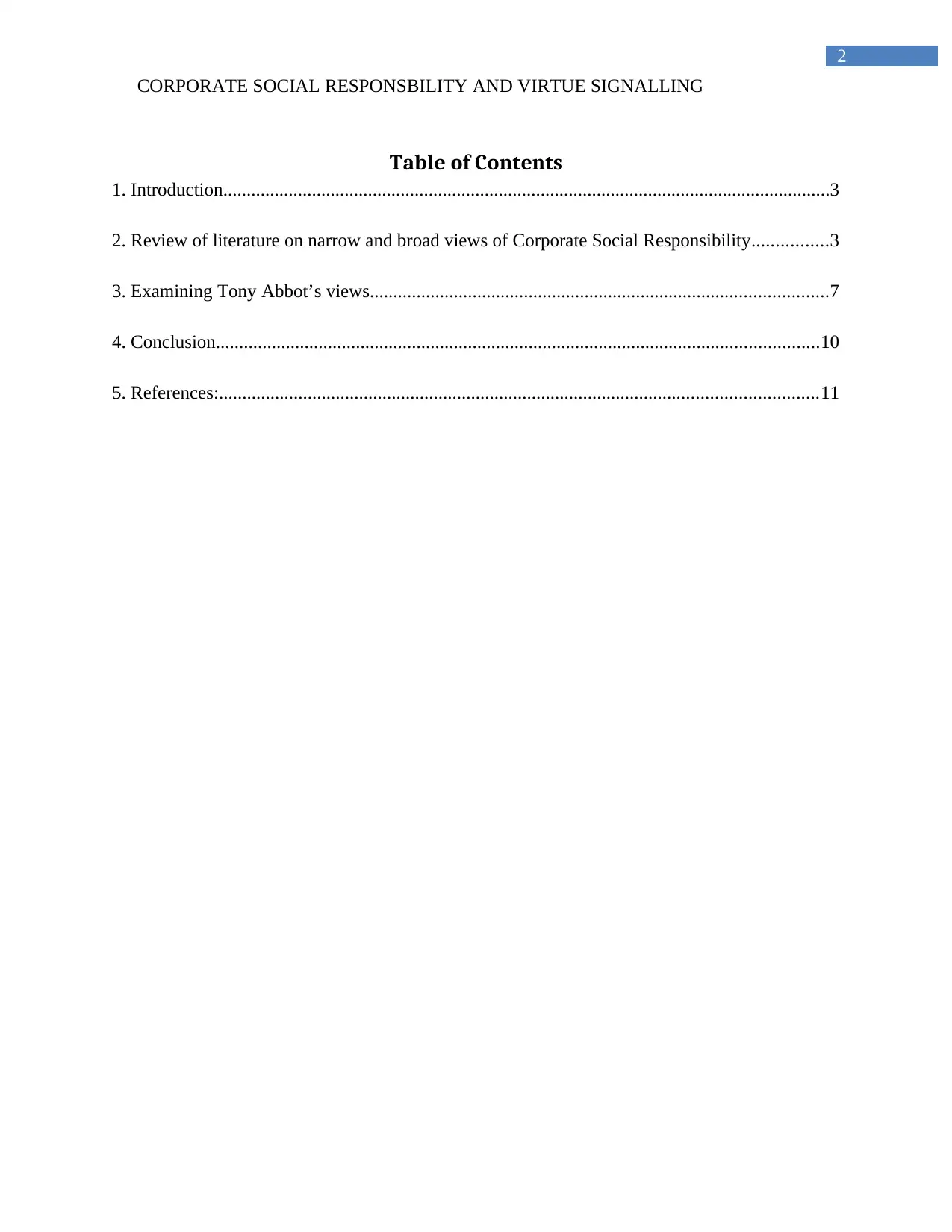
2
CORPORATE SOCIAL RESPONSBILITY AND VIRTUE SIGNALLING
Table of Contents
1. Introduction..................................................................................................................................3
2. Review of literature on narrow and broad views of Corporate Social Responsibility................3
3. Examining Tony Abbot’s views..................................................................................................7
4. Conclusion.................................................................................................................................10
5. References:................................................................................................................................11
CORPORATE SOCIAL RESPONSBILITY AND VIRTUE SIGNALLING
Table of Contents
1. Introduction..................................................................................................................................3
2. Review of literature on narrow and broad views of Corporate Social Responsibility................3
3. Examining Tony Abbot’s views..................................................................................................7
4. Conclusion.................................................................................................................................10
5. References:................................................................................................................................11
⊘ This is a preview!⊘
Do you want full access?
Subscribe today to unlock all pages.

Trusted by 1+ million students worldwide
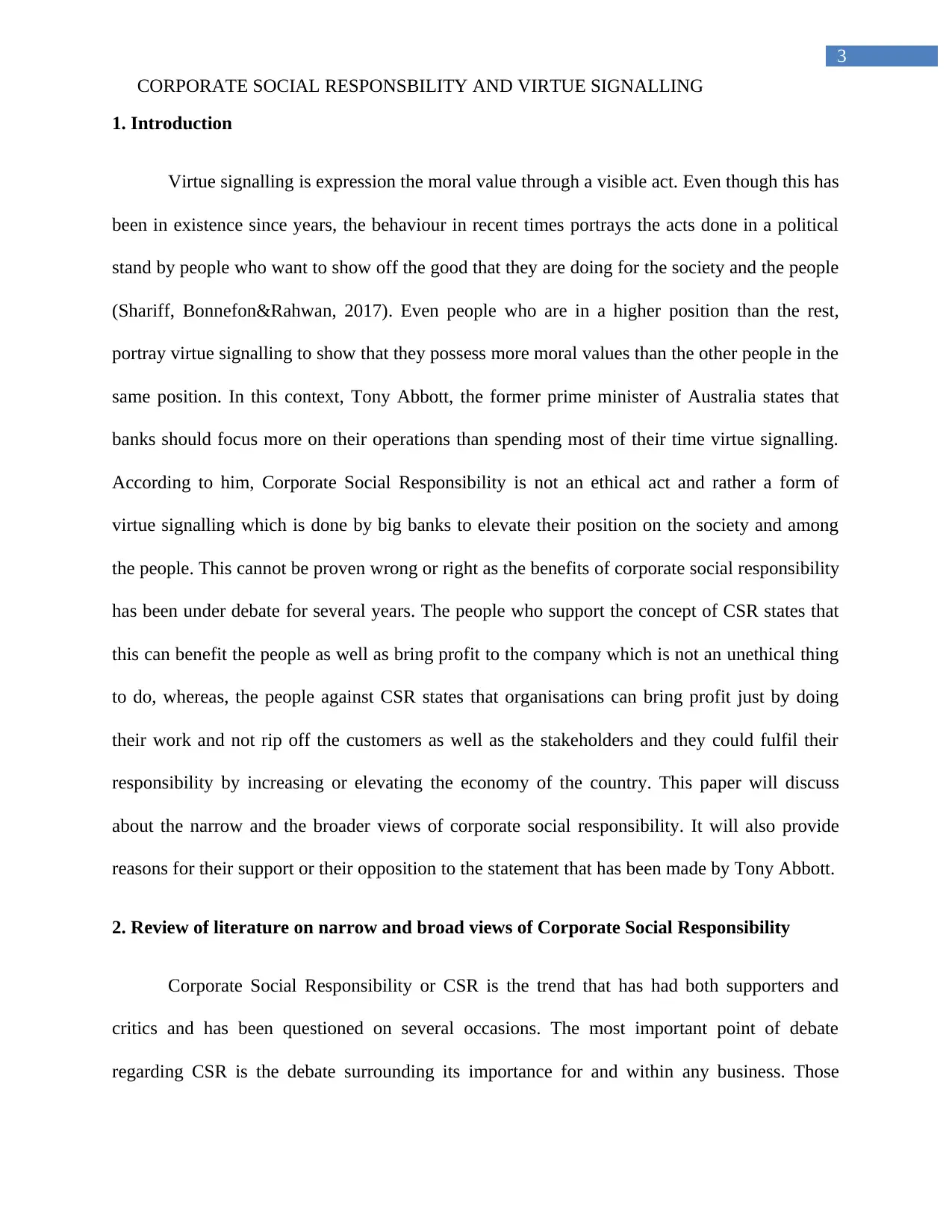
3
CORPORATE SOCIAL RESPONSBILITY AND VIRTUE SIGNALLING
1. Introduction
Virtue signalling is expression the moral value through a visible act. Even though this has
been in existence since years, the behaviour in recent times portrays the acts done in a political
stand by people who want to show off the good that they are doing for the society and the people
(Shariff, Bonnefon&Rahwan, 2017). Even people who are in a higher position than the rest,
portray virtue signalling to show that they possess more moral values than the other people in the
same position. In this context, Tony Abbott, the former prime minister of Australia states that
banks should focus more on their operations than spending most of their time virtue signalling.
According to him, Corporate Social Responsibility is not an ethical act and rather a form of
virtue signalling which is done by big banks to elevate their position on the society and among
the people. This cannot be proven wrong or right as the benefits of corporate social responsibility
has been under debate for several years. The people who support the concept of CSR states that
this can benefit the people as well as bring profit to the company which is not an unethical thing
to do, whereas, the people against CSR states that organisations can bring profit just by doing
their work and not rip off the customers as well as the stakeholders and they could fulfil their
responsibility by increasing or elevating the economy of the country. This paper will discuss
about the narrow and the broader views of corporate social responsibility. It will also provide
reasons for their support or their opposition to the statement that has been made by Tony Abbott.
2. Review of literature on narrow and broad views of Corporate Social Responsibility
Corporate Social Responsibility or CSR is the trend that has had both supporters and
critics and has been questioned on several occasions. The most important point of debate
regarding CSR is the debate surrounding its importance for and within any business. Those
CORPORATE SOCIAL RESPONSBILITY AND VIRTUE SIGNALLING
1. Introduction
Virtue signalling is expression the moral value through a visible act. Even though this has
been in existence since years, the behaviour in recent times portrays the acts done in a political
stand by people who want to show off the good that they are doing for the society and the people
(Shariff, Bonnefon&Rahwan, 2017). Even people who are in a higher position than the rest,
portray virtue signalling to show that they possess more moral values than the other people in the
same position. In this context, Tony Abbott, the former prime minister of Australia states that
banks should focus more on their operations than spending most of their time virtue signalling.
According to him, Corporate Social Responsibility is not an ethical act and rather a form of
virtue signalling which is done by big banks to elevate their position on the society and among
the people. This cannot be proven wrong or right as the benefits of corporate social responsibility
has been under debate for several years. The people who support the concept of CSR states that
this can benefit the people as well as bring profit to the company which is not an unethical thing
to do, whereas, the people against CSR states that organisations can bring profit just by doing
their work and not rip off the customers as well as the stakeholders and they could fulfil their
responsibility by increasing or elevating the economy of the country. This paper will discuss
about the narrow and the broader views of corporate social responsibility. It will also provide
reasons for their support or their opposition to the statement that has been made by Tony Abbott.
2. Review of literature on narrow and broad views of Corporate Social Responsibility
Corporate Social Responsibility or CSR is the trend that has had both supporters and
critics and has been questioned on several occasions. The most important point of debate
regarding CSR is the debate surrounding its importance for and within any business. Those
Paraphrase This Document
Need a fresh take? Get an instant paraphrase of this document with our AI Paraphraser
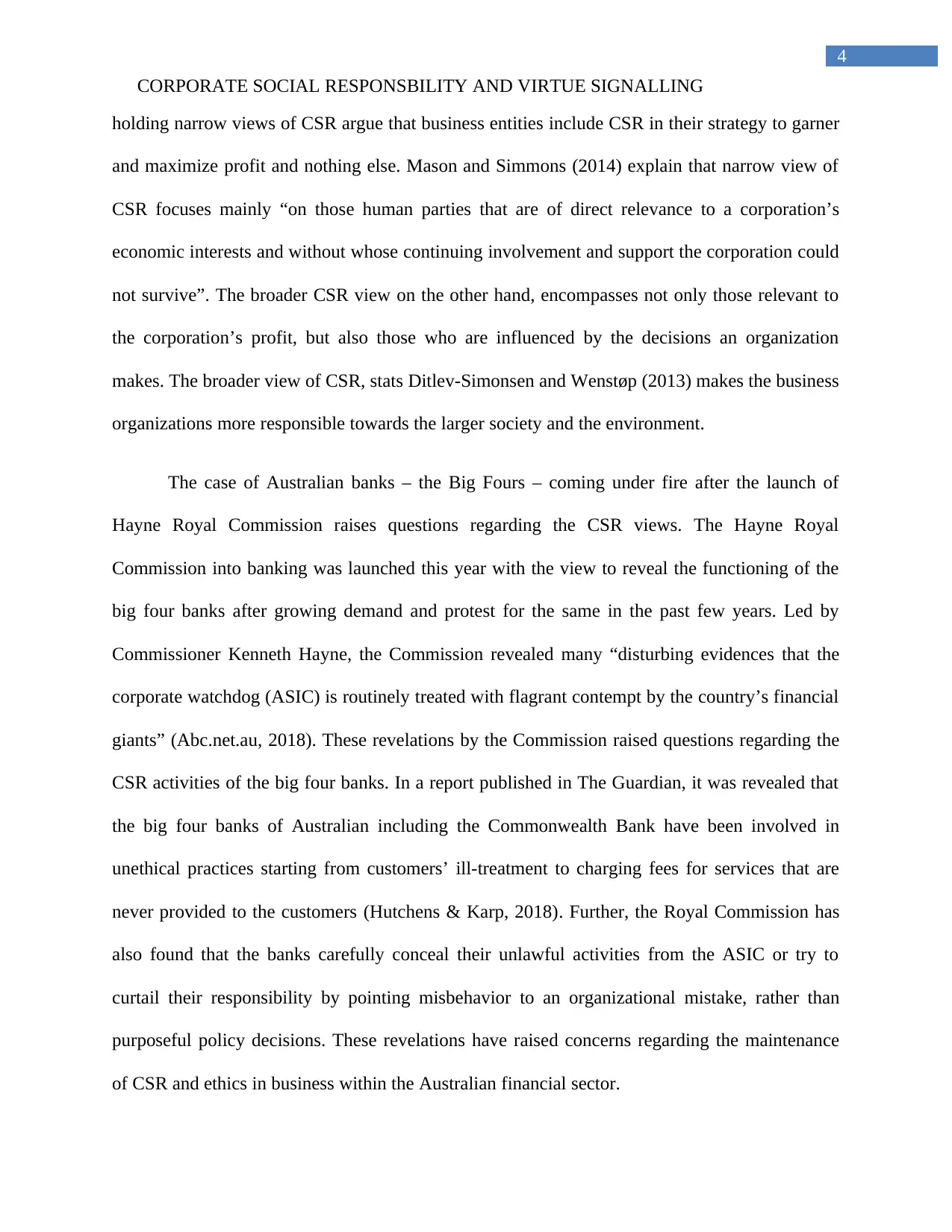
4
CORPORATE SOCIAL RESPONSBILITY AND VIRTUE SIGNALLING
holding narrow views of CSR argue that business entities include CSR in their strategy to garner
and maximize profit and nothing else. Mason and Simmons (2014) explain that narrow view of
CSR focuses mainly “on those human parties that are of direct relevance to a corporation’s
economic interests and without whose continuing involvement and support the corporation could
not survive”. The broader CSR view on the other hand, encompasses not only those relevant to
the corporation’s profit, but also those who are influenced by the decisions an organization
makes. The broader view of CSR, stats Ditlev-Simonsen and Wenstøp (2013) makes the business
organizations more responsible towards the larger society and the environment.
The case of Australian banks – the Big Fours – coming under fire after the launch of
Hayne Royal Commission raises questions regarding the CSR views. The Hayne Royal
Commission into banking was launched this year with the view to reveal the functioning of the
big four banks after growing demand and protest for the same in the past few years. Led by
Commissioner Kenneth Hayne, the Commission revealed many “disturbing evidences that the
corporate watchdog (ASIC) is routinely treated with flagrant contempt by the country’s financial
giants” (Abc.net.au, 2018). These revelations by the Commission raised questions regarding the
CSR activities of the big four banks. In a report published in The Guardian, it was revealed that
the big four banks of Australian including the Commonwealth Bank have been involved in
unethical practices starting from customers’ ill-treatment to charging fees for services that are
never provided to the customers (Hutchens & Karp, 2018). Further, the Royal Commission has
also found that the banks carefully conceal their unlawful activities from the ASIC or try to
curtail their responsibility by pointing misbehavior to an organizational mistake, rather than
purposeful policy decisions. These revelations have raised concerns regarding the maintenance
of CSR and ethics in business within the Australian financial sector.
CORPORATE SOCIAL RESPONSBILITY AND VIRTUE SIGNALLING
holding narrow views of CSR argue that business entities include CSR in their strategy to garner
and maximize profit and nothing else. Mason and Simmons (2014) explain that narrow view of
CSR focuses mainly “on those human parties that are of direct relevance to a corporation’s
economic interests and without whose continuing involvement and support the corporation could
not survive”. The broader CSR view on the other hand, encompasses not only those relevant to
the corporation’s profit, but also those who are influenced by the decisions an organization
makes. The broader view of CSR, stats Ditlev-Simonsen and Wenstøp (2013) makes the business
organizations more responsible towards the larger society and the environment.
The case of Australian banks – the Big Fours – coming under fire after the launch of
Hayne Royal Commission raises questions regarding the CSR views. The Hayne Royal
Commission into banking was launched this year with the view to reveal the functioning of the
big four banks after growing demand and protest for the same in the past few years. Led by
Commissioner Kenneth Hayne, the Commission revealed many “disturbing evidences that the
corporate watchdog (ASIC) is routinely treated with flagrant contempt by the country’s financial
giants” (Abc.net.au, 2018). These revelations by the Commission raised questions regarding the
CSR activities of the big four banks. In a report published in The Guardian, it was revealed that
the big four banks of Australian including the Commonwealth Bank have been involved in
unethical practices starting from customers’ ill-treatment to charging fees for services that are
never provided to the customers (Hutchens & Karp, 2018). Further, the Royal Commission has
also found that the banks carefully conceal their unlawful activities from the ASIC or try to
curtail their responsibility by pointing misbehavior to an organizational mistake, rather than
purposeful policy decisions. These revelations have raised concerns regarding the maintenance
of CSR and ethics in business within the Australian financial sector.
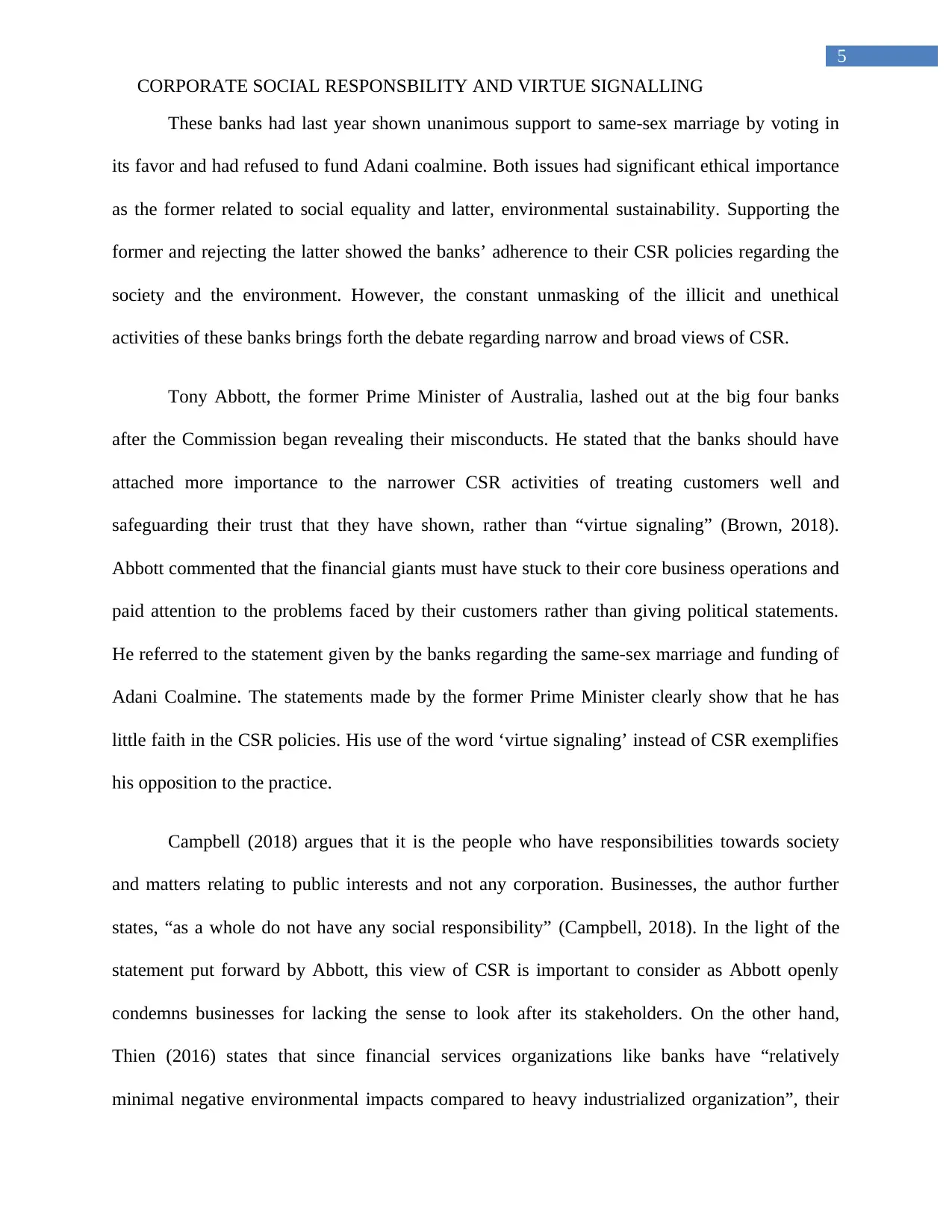
5
CORPORATE SOCIAL RESPONSBILITY AND VIRTUE SIGNALLING
These banks had last year shown unanimous support to same-sex marriage by voting in
its favor and had refused to fund Adani coalmine. Both issues had significant ethical importance
as the former related to social equality and latter, environmental sustainability. Supporting the
former and rejecting the latter showed the banks’ adherence to their CSR policies regarding the
society and the environment. However, the constant unmasking of the illicit and unethical
activities of these banks brings forth the debate regarding narrow and broad views of CSR.
Tony Abbott, the former Prime Minister of Australia, lashed out at the big four banks
after the Commission began revealing their misconducts. He stated that the banks should have
attached more importance to the narrower CSR activities of treating customers well and
safeguarding their trust that they have shown, rather than “virtue signaling” (Brown, 2018).
Abbott commented that the financial giants must have stuck to their core business operations and
paid attention to the problems faced by their customers rather than giving political statements.
He referred to the statement given by the banks regarding the same-sex marriage and funding of
Adani Coalmine. The statements made by the former Prime Minister clearly show that he has
little faith in the CSR policies. His use of the word ‘virtue signaling’ instead of CSR exemplifies
his opposition to the practice.
Campbell (2018) argues that it is the people who have responsibilities towards society
and matters relating to public interests and not any corporation. Businesses, the author further
states, “as a whole do not have any social responsibility” (Campbell, 2018). In the light of the
statement put forward by Abbott, this view of CSR is important to consider as Abbott openly
condemns businesses for lacking the sense to look after its stakeholders. On the other hand,
Thien (2016) states that since financial services organizations like banks have “relatively
minimal negative environmental impacts compared to heavy industrialized organization”, their
CORPORATE SOCIAL RESPONSBILITY AND VIRTUE SIGNALLING
These banks had last year shown unanimous support to same-sex marriage by voting in
its favor and had refused to fund Adani coalmine. Both issues had significant ethical importance
as the former related to social equality and latter, environmental sustainability. Supporting the
former and rejecting the latter showed the banks’ adherence to their CSR policies regarding the
society and the environment. However, the constant unmasking of the illicit and unethical
activities of these banks brings forth the debate regarding narrow and broad views of CSR.
Tony Abbott, the former Prime Minister of Australia, lashed out at the big four banks
after the Commission began revealing their misconducts. He stated that the banks should have
attached more importance to the narrower CSR activities of treating customers well and
safeguarding their trust that they have shown, rather than “virtue signaling” (Brown, 2018).
Abbott commented that the financial giants must have stuck to their core business operations and
paid attention to the problems faced by their customers rather than giving political statements.
He referred to the statement given by the banks regarding the same-sex marriage and funding of
Adani Coalmine. The statements made by the former Prime Minister clearly show that he has
little faith in the CSR policies. His use of the word ‘virtue signaling’ instead of CSR exemplifies
his opposition to the practice.
Campbell (2018) argues that it is the people who have responsibilities towards society
and matters relating to public interests and not any corporation. Businesses, the author further
states, “as a whole do not have any social responsibility” (Campbell, 2018). In the light of the
statement put forward by Abbott, this view of CSR is important to consider as Abbott openly
condemns businesses for lacking the sense to look after its stakeholders. On the other hand,
Thien (2016) states that since financial services organizations like banks have “relatively
minimal negative environmental impacts compared to heavy industrialized organization”, their
⊘ This is a preview!⊘
Do you want full access?
Subscribe today to unlock all pages.

Trusted by 1+ million students worldwide
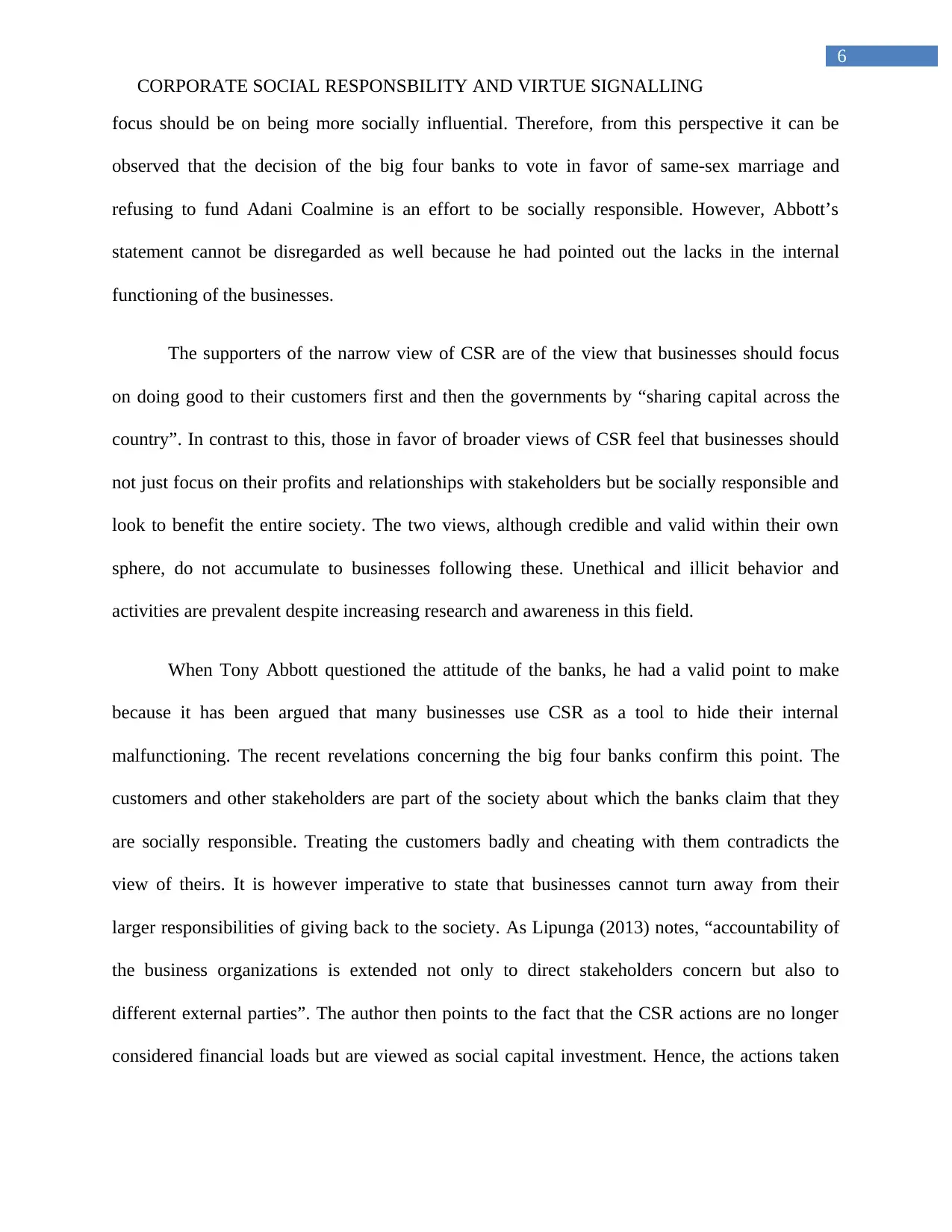
6
CORPORATE SOCIAL RESPONSBILITY AND VIRTUE SIGNALLING
focus should be on being more socially influential. Therefore, from this perspective it can be
observed that the decision of the big four banks to vote in favor of same-sex marriage and
refusing to fund Adani Coalmine is an effort to be socially responsible. However, Abbott’s
statement cannot be disregarded as well because he had pointed out the lacks in the internal
functioning of the businesses.
The supporters of the narrow view of CSR are of the view that businesses should focus
on doing good to their customers first and then the governments by “sharing capital across the
country”. In contrast to this, those in favor of broader views of CSR feel that businesses should
not just focus on their profits and relationships with stakeholders but be socially responsible and
look to benefit the entire society. The two views, although credible and valid within their own
sphere, do not accumulate to businesses following these. Unethical and illicit behavior and
activities are prevalent despite increasing research and awareness in this field.
When Tony Abbott questioned the attitude of the banks, he had a valid point to make
because it has been argued that many businesses use CSR as a tool to hide their internal
malfunctioning. The recent revelations concerning the big four banks confirm this point. The
customers and other stakeholders are part of the society about which the banks claim that they
are socially responsible. Treating the customers badly and cheating with them contradicts the
view of theirs. It is however imperative to state that businesses cannot turn away from their
larger responsibilities of giving back to the society. As Lipunga (2013) notes, “accountability of
the business organizations is extended not only to direct stakeholders concern but also to
different external parties”. The author then points to the fact that the CSR actions are no longer
considered financial loads but are viewed as social capital investment. Hence, the actions taken
CORPORATE SOCIAL RESPONSBILITY AND VIRTUE SIGNALLING
focus should be on being more socially influential. Therefore, from this perspective it can be
observed that the decision of the big four banks to vote in favor of same-sex marriage and
refusing to fund Adani Coalmine is an effort to be socially responsible. However, Abbott’s
statement cannot be disregarded as well because he had pointed out the lacks in the internal
functioning of the businesses.
The supporters of the narrow view of CSR are of the view that businesses should focus
on doing good to their customers first and then the governments by “sharing capital across the
country”. In contrast to this, those in favor of broader views of CSR feel that businesses should
not just focus on their profits and relationships with stakeholders but be socially responsible and
look to benefit the entire society. The two views, although credible and valid within their own
sphere, do not accumulate to businesses following these. Unethical and illicit behavior and
activities are prevalent despite increasing research and awareness in this field.
When Tony Abbott questioned the attitude of the banks, he had a valid point to make
because it has been argued that many businesses use CSR as a tool to hide their internal
malfunctioning. The recent revelations concerning the big four banks confirm this point. The
customers and other stakeholders are part of the society about which the banks claim that they
are socially responsible. Treating the customers badly and cheating with them contradicts the
view of theirs. It is however imperative to state that businesses cannot turn away from their
larger responsibilities of giving back to the society. As Lipunga (2013) notes, “accountability of
the business organizations is extended not only to direct stakeholders concern but also to
different external parties”. The author then points to the fact that the CSR actions are no longer
considered financial loads but are viewed as social capital investment. Hence, the actions taken
Paraphrase This Document
Need a fresh take? Get an instant paraphrase of this document with our AI Paraphraser
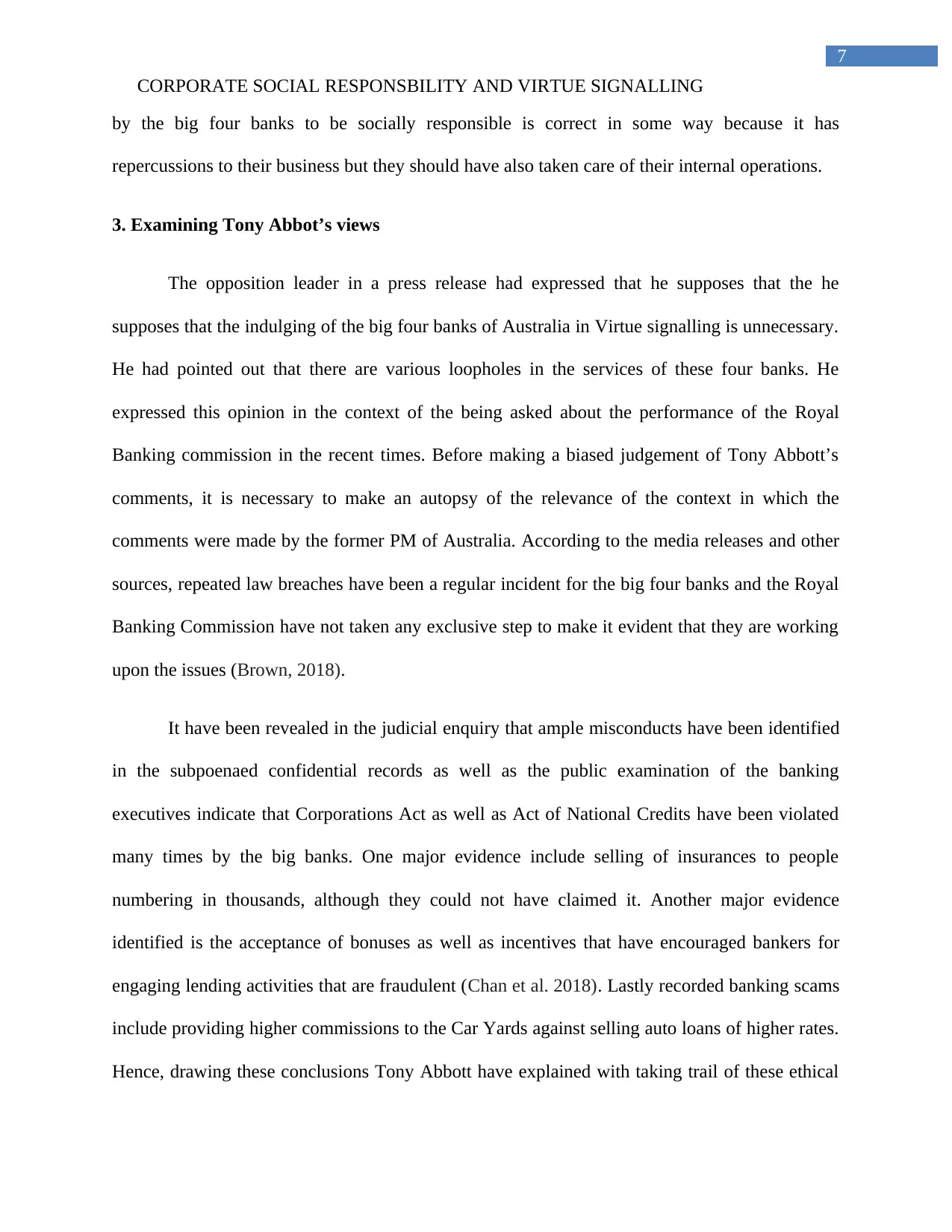
7
CORPORATE SOCIAL RESPONSBILITY AND VIRTUE SIGNALLING
by the big four banks to be socially responsible is correct in some way because it has
repercussions to their business but they should have also taken care of their internal operations.
3. Examining Tony Abbot’s views
The opposition leader in a press release had expressed that he supposes that the he
supposes that the indulging of the big four banks of Australia in Virtue signalling is unnecessary.
He had pointed out that there are various loopholes in the services of these four banks. He
expressed this opinion in the context of the being asked about the performance of the Royal
Banking commission in the recent times. Before making a biased judgement of Tony Abbott’s
comments, it is necessary to make an autopsy of the relevance of the context in which the
comments were made by the former PM of Australia. According to the media releases and other
sources, repeated law breaches have been a regular incident for the big four banks and the Royal
Banking Commission have not taken any exclusive step to make it evident that they are working
upon the issues (Brown, 2018).
It have been revealed in the judicial enquiry that ample misconducts have been identified
in the subpoenaed confidential records as well as the public examination of the banking
executives indicate that Corporations Act as well as Act of National Credits have been violated
many times by the big banks. One major evidence include selling of insurances to people
numbering in thousands, although they could not have claimed it. Another major evidence
identified is the acceptance of bonuses as well as incentives that have encouraged bankers for
engaging lending activities that are fraudulent (Chan et al. 2018). Lastly recorded banking scams
include providing higher commissions to the Car Yards against selling auto loans of higher rates.
Hence, drawing these conclusions Tony Abbott have explained with taking trail of these ethical
CORPORATE SOCIAL RESPONSBILITY AND VIRTUE SIGNALLING
by the big four banks to be socially responsible is correct in some way because it has
repercussions to their business but they should have also taken care of their internal operations.
3. Examining Tony Abbot’s views
The opposition leader in a press release had expressed that he supposes that the he
supposes that the indulging of the big four banks of Australia in Virtue signalling is unnecessary.
He had pointed out that there are various loopholes in the services of these four banks. He
expressed this opinion in the context of the being asked about the performance of the Royal
Banking commission in the recent times. Before making a biased judgement of Tony Abbott’s
comments, it is necessary to make an autopsy of the relevance of the context in which the
comments were made by the former PM of Australia. According to the media releases and other
sources, repeated law breaches have been a regular incident for the big four banks and the Royal
Banking Commission have not taken any exclusive step to make it evident that they are working
upon the issues (Brown, 2018).
It have been revealed in the judicial enquiry that ample misconducts have been identified
in the subpoenaed confidential records as well as the public examination of the banking
executives indicate that Corporations Act as well as Act of National Credits have been violated
many times by the big banks. One major evidence include selling of insurances to people
numbering in thousands, although they could not have claimed it. Another major evidence
identified is the acceptance of bonuses as well as incentives that have encouraged bankers for
engaging lending activities that are fraudulent (Chan et al. 2018). Lastly recorded banking scams
include providing higher commissions to the Car Yards against selling auto loans of higher rates.
Hence, drawing these conclusions Tony Abbott have explained with taking trail of these ethical
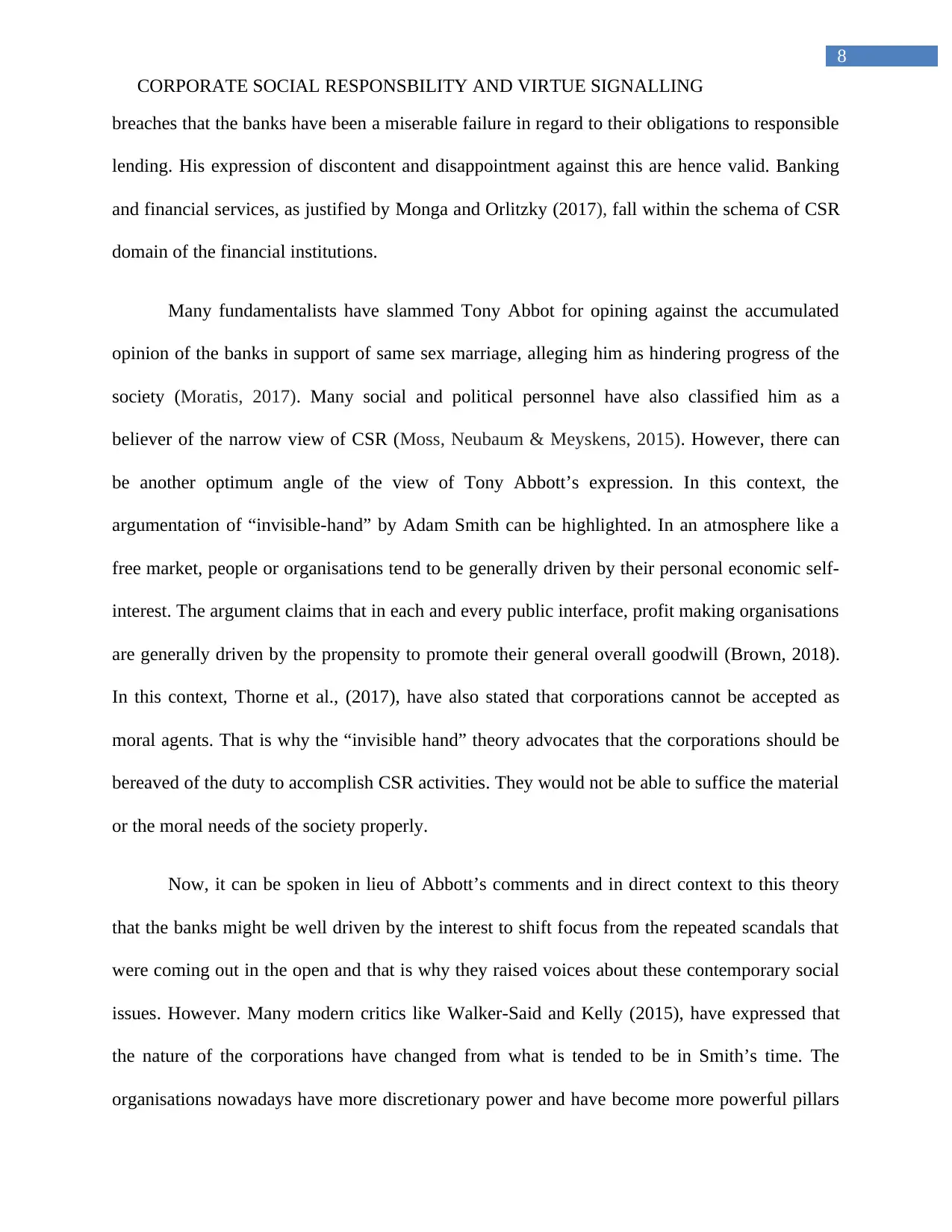
8
CORPORATE SOCIAL RESPONSBILITY AND VIRTUE SIGNALLING
breaches that the banks have been a miserable failure in regard to their obligations to responsible
lending. His expression of discontent and disappointment against this are hence valid. Banking
and financial services, as justified by Monga and Orlitzky (2017), fall within the schema of CSR
domain of the financial institutions.
Many fundamentalists have slammed Tony Abbot for opining against the accumulated
opinion of the banks in support of same sex marriage, alleging him as hindering progress of the
society (Moratis, 2017). Many social and political personnel have also classified him as a
believer of the narrow view of CSR (Moss, Neubaum & Meyskens, 2015). However, there can
be another optimum angle of the view of Tony Abbott’s expression. In this context, the
argumentation of “invisible-hand” by Adam Smith can be highlighted. In an atmosphere like a
free market, people or organisations tend to be generally driven by their personal economic self-
interest. The argument claims that in each and every public interface, profit making organisations
are generally driven by the propensity to promote their general overall goodwill (Brown, 2018).
In this context, Thorne et al., (2017), have also stated that corporations cannot be accepted as
moral agents. That is why the “invisible hand” theory advocates that the corporations should be
bereaved of the duty to accomplish CSR activities. They would not be able to suffice the material
or the moral needs of the society properly.
Now, it can be spoken in lieu of Abbott’s comments and in direct context to this theory
that the banks might be well driven by the interest to shift focus from the repeated scandals that
were coming out in the open and that is why they raised voices about these contemporary social
issues. However. Many modern critics like Walker-Said and Kelly (2015), have expressed that
the nature of the corporations have changed from what is tended to be in Smith’s time. The
organisations nowadays have more discretionary power and have become more powerful pillars
CORPORATE SOCIAL RESPONSBILITY AND VIRTUE SIGNALLING
breaches that the banks have been a miserable failure in regard to their obligations to responsible
lending. His expression of discontent and disappointment against this are hence valid. Banking
and financial services, as justified by Monga and Orlitzky (2017), fall within the schema of CSR
domain of the financial institutions.
Many fundamentalists have slammed Tony Abbot for opining against the accumulated
opinion of the banks in support of same sex marriage, alleging him as hindering progress of the
society (Moratis, 2017). Many social and political personnel have also classified him as a
believer of the narrow view of CSR (Moss, Neubaum & Meyskens, 2015). However, there can
be another optimum angle of the view of Tony Abbott’s expression. In this context, the
argumentation of “invisible-hand” by Adam Smith can be highlighted. In an atmosphere like a
free market, people or organisations tend to be generally driven by their personal economic self-
interest. The argument claims that in each and every public interface, profit making organisations
are generally driven by the propensity to promote their general overall goodwill (Brown, 2018).
In this context, Thorne et al., (2017), have also stated that corporations cannot be accepted as
moral agents. That is why the “invisible hand” theory advocates that the corporations should be
bereaved of the duty to accomplish CSR activities. They would not be able to suffice the material
or the moral needs of the society properly.
Now, it can be spoken in lieu of Abbott’s comments and in direct context to this theory
that the banks might be well driven by the interest to shift focus from the repeated scandals that
were coming out in the open and that is why they raised voices about these contemporary social
issues. However. Many modern critics like Walker-Said and Kelly (2015), have expressed that
the nature of the corporations have changed from what is tended to be in Smith’s time. The
organisations nowadays have more discretionary power and have become more powerful pillars
⊘ This is a preview!⊘
Do you want full access?
Subscribe today to unlock all pages.

Trusted by 1+ million students worldwide
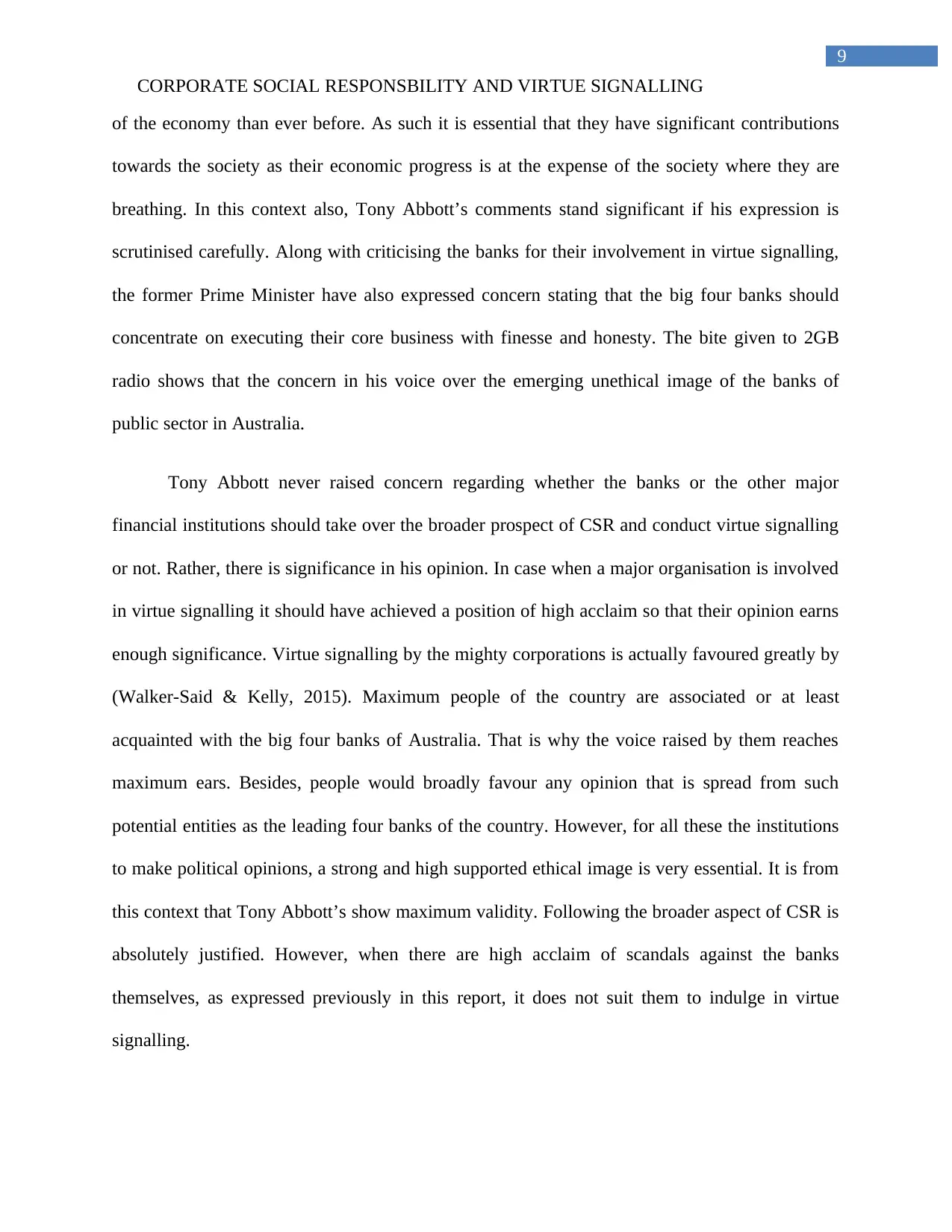
9
CORPORATE SOCIAL RESPONSBILITY AND VIRTUE SIGNALLING
of the economy than ever before. As such it is essential that they have significant contributions
towards the society as their economic progress is at the expense of the society where they are
breathing. In this context also, Tony Abbott’s comments stand significant if his expression is
scrutinised carefully. Along with criticising the banks for their involvement in virtue signalling,
the former Prime Minister have also expressed concern stating that the big four banks should
concentrate on executing their core business with finesse and honesty. The bite given to 2GB
radio shows that the concern in his voice over the emerging unethical image of the banks of
public sector in Australia.
Tony Abbott never raised concern regarding whether the banks or the other major
financial institutions should take over the broader prospect of CSR and conduct virtue signalling
or not. Rather, there is significance in his opinion. In case when a major organisation is involved
in virtue signalling it should have achieved a position of high acclaim so that their opinion earns
enough significance. Virtue signalling by the mighty corporations is actually favoured greatly by
(Walker-Said & Kelly, 2015). Maximum people of the country are associated or at least
acquainted with the big four banks of Australia. That is why the voice raised by them reaches
maximum ears. Besides, people would broadly favour any opinion that is spread from such
potential entities as the leading four banks of the country. However, for all these the institutions
to make political opinions, a strong and high supported ethical image is very essential. It is from
this context that Tony Abbott’s show maximum validity. Following the broader aspect of CSR is
absolutely justified. However, when there are high acclaim of scandals against the banks
themselves, as expressed previously in this report, it does not suit them to indulge in virtue
signalling.
CORPORATE SOCIAL RESPONSBILITY AND VIRTUE SIGNALLING
of the economy than ever before. As such it is essential that they have significant contributions
towards the society as their economic progress is at the expense of the society where they are
breathing. In this context also, Tony Abbott’s comments stand significant if his expression is
scrutinised carefully. Along with criticising the banks for their involvement in virtue signalling,
the former Prime Minister have also expressed concern stating that the big four banks should
concentrate on executing their core business with finesse and honesty. The bite given to 2GB
radio shows that the concern in his voice over the emerging unethical image of the banks of
public sector in Australia.
Tony Abbott never raised concern regarding whether the banks or the other major
financial institutions should take over the broader prospect of CSR and conduct virtue signalling
or not. Rather, there is significance in his opinion. In case when a major organisation is involved
in virtue signalling it should have achieved a position of high acclaim so that their opinion earns
enough significance. Virtue signalling by the mighty corporations is actually favoured greatly by
(Walker-Said & Kelly, 2015). Maximum people of the country are associated or at least
acquainted with the big four banks of Australia. That is why the voice raised by them reaches
maximum ears. Besides, people would broadly favour any opinion that is spread from such
potential entities as the leading four banks of the country. However, for all these the institutions
to make political opinions, a strong and high supported ethical image is very essential. It is from
this context that Tony Abbott’s show maximum validity. Following the broader aspect of CSR is
absolutely justified. However, when there are high acclaim of scandals against the banks
themselves, as expressed previously in this report, it does not suit them to indulge in virtue
signalling.
Paraphrase This Document
Need a fresh take? Get an instant paraphrase of this document with our AI Paraphraser
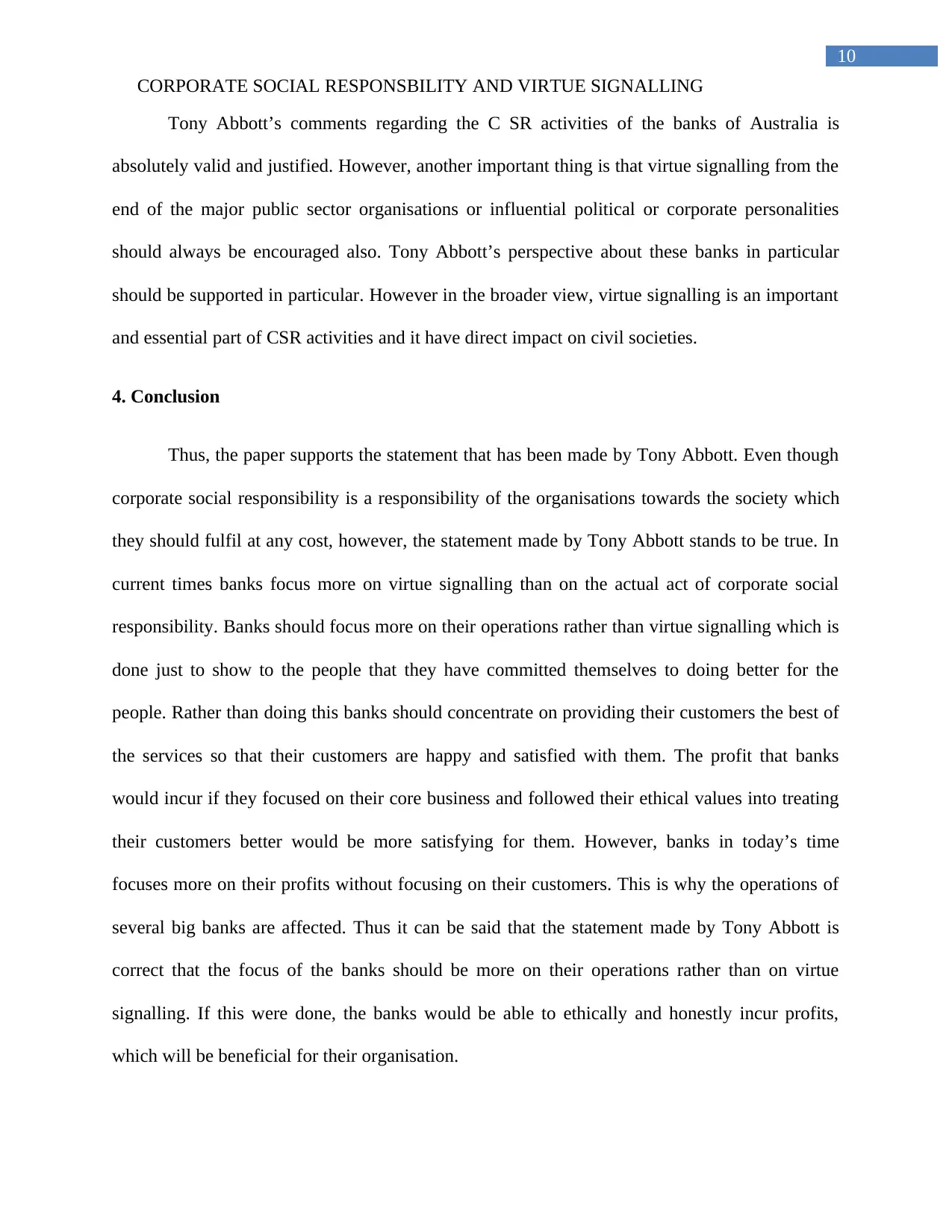
10
CORPORATE SOCIAL RESPONSBILITY AND VIRTUE SIGNALLING
Tony Abbott’s comments regarding the C SR activities of the banks of Australia is
absolutely valid and justified. However, another important thing is that virtue signalling from the
end of the major public sector organisations or influential political or corporate personalities
should always be encouraged also. Tony Abbott’s perspective about these banks in particular
should be supported in particular. However in the broader view, virtue signalling is an important
and essential part of CSR activities and it have direct impact on civil societies.
4. Conclusion
Thus, the paper supports the statement that has been made by Tony Abbott. Even though
corporate social responsibility is a responsibility of the organisations towards the society which
they should fulfil at any cost, however, the statement made by Tony Abbott stands to be true. In
current times banks focus more on virtue signalling than on the actual act of corporate social
responsibility. Banks should focus more on their operations rather than virtue signalling which is
done just to show to the people that they have committed themselves to doing better for the
people. Rather than doing this banks should concentrate on providing their customers the best of
the services so that their customers are happy and satisfied with them. The profit that banks
would incur if they focused on their core business and followed their ethical values into treating
their customers better would be more satisfying for them. However, banks in today’s time
focuses more on their profits without focusing on their customers. This is why the operations of
several big banks are affected. Thus it can be said that the statement made by Tony Abbott is
correct that the focus of the banks should be more on their operations rather than on virtue
signalling. If this were done, the banks would be able to ethically and honestly incur profits,
which will be beneficial for their organisation.
CORPORATE SOCIAL RESPONSBILITY AND VIRTUE SIGNALLING
Tony Abbott’s comments regarding the C SR activities of the banks of Australia is
absolutely valid and justified. However, another important thing is that virtue signalling from the
end of the major public sector organisations or influential political or corporate personalities
should always be encouraged also. Tony Abbott’s perspective about these banks in particular
should be supported in particular. However in the broader view, virtue signalling is an important
and essential part of CSR activities and it have direct impact on civil societies.
4. Conclusion
Thus, the paper supports the statement that has been made by Tony Abbott. Even though
corporate social responsibility is a responsibility of the organisations towards the society which
they should fulfil at any cost, however, the statement made by Tony Abbott stands to be true. In
current times banks focus more on virtue signalling than on the actual act of corporate social
responsibility. Banks should focus more on their operations rather than virtue signalling which is
done just to show to the people that they have committed themselves to doing better for the
people. Rather than doing this banks should concentrate on providing their customers the best of
the services so that their customers are happy and satisfied with them. The profit that banks
would incur if they focused on their core business and followed their ethical values into treating
their customers better would be more satisfying for them. However, banks in today’s time
focuses more on their profits without focusing on their customers. This is why the operations of
several big banks are affected. Thus it can be said that the statement made by Tony Abbott is
correct that the focus of the banks should be more on their operations rather than on virtue
signalling. If this were done, the banks would be able to ethically and honestly incur profits,
which will be beneficial for their organisation.
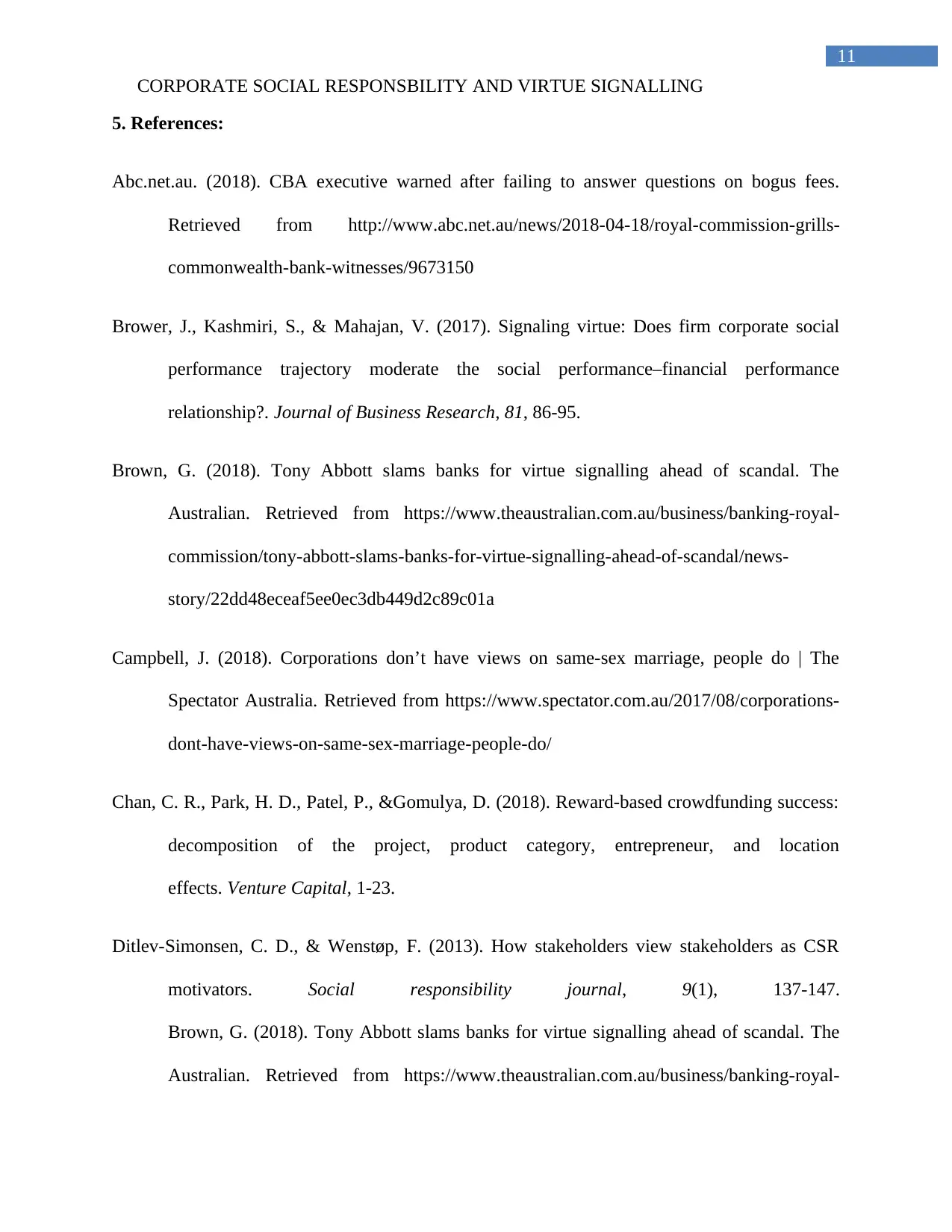
11
CORPORATE SOCIAL RESPONSBILITY AND VIRTUE SIGNALLING
5. References:
Abc.net.au. (2018). CBA executive warned after failing to answer questions on bogus fees.
Retrieved from http://www.abc.net.au/news/2018-04-18/royal-commission-grills-
commonwealth-bank-witnesses/9673150
Brower, J., Kashmiri, S., & Mahajan, V. (2017). Signaling virtue: Does firm corporate social
performance trajectory moderate the social performance–financial performance
relationship?. Journal of Business Research, 81, 86-95.
Brown, G. (2018). Tony Abbott slams banks for virtue signalling ahead of scandal. The
Australian. Retrieved from https://www.theaustralian.com.au/business/banking-royal-
commission/tony-abbott-slams-banks-for-virtue-signalling-ahead-of-scandal/news-
story/22dd48eceaf5ee0ec3db449d2c89c01a
Campbell, J. (2018). Corporations don’t have views on same-sex marriage, people do | The
Spectator Australia. Retrieved from https://www.spectator.com.au/2017/08/corporations-
dont-have-views-on-same-sex-marriage-people-do/
Chan, C. R., Park, H. D., Patel, P., &Gomulya, D. (2018). Reward-based crowdfunding success:
decomposition of the project, product category, entrepreneur, and location
effects. Venture Capital, 1-23.
Ditlev-Simonsen, C. D., & Wenstøp, F. (2013). How stakeholders view stakeholders as CSR
motivators. Social responsibility journal, 9(1), 137-147.
Brown, G. (2018). Tony Abbott slams banks for virtue signalling ahead of scandal. The
Australian. Retrieved from https://www.theaustralian.com.au/business/banking-royal-
CORPORATE SOCIAL RESPONSBILITY AND VIRTUE SIGNALLING
5. References:
Abc.net.au. (2018). CBA executive warned after failing to answer questions on bogus fees.
Retrieved from http://www.abc.net.au/news/2018-04-18/royal-commission-grills-
commonwealth-bank-witnesses/9673150
Brower, J., Kashmiri, S., & Mahajan, V. (2017). Signaling virtue: Does firm corporate social
performance trajectory moderate the social performance–financial performance
relationship?. Journal of Business Research, 81, 86-95.
Brown, G. (2018). Tony Abbott slams banks for virtue signalling ahead of scandal. The
Australian. Retrieved from https://www.theaustralian.com.au/business/banking-royal-
commission/tony-abbott-slams-banks-for-virtue-signalling-ahead-of-scandal/news-
story/22dd48eceaf5ee0ec3db449d2c89c01a
Campbell, J. (2018). Corporations don’t have views on same-sex marriage, people do | The
Spectator Australia. Retrieved from https://www.spectator.com.au/2017/08/corporations-
dont-have-views-on-same-sex-marriage-people-do/
Chan, C. R., Park, H. D., Patel, P., &Gomulya, D. (2018). Reward-based crowdfunding success:
decomposition of the project, product category, entrepreneur, and location
effects. Venture Capital, 1-23.
Ditlev-Simonsen, C. D., & Wenstøp, F. (2013). How stakeholders view stakeholders as CSR
motivators. Social responsibility journal, 9(1), 137-147.
Brown, G. (2018). Tony Abbott slams banks for virtue signalling ahead of scandal. The
Australian. Retrieved from https://www.theaustralian.com.au/business/banking-royal-
⊘ This is a preview!⊘
Do you want full access?
Subscribe today to unlock all pages.

Trusted by 1+ million students worldwide
1 out of 14
Your All-in-One AI-Powered Toolkit for Academic Success.
+13062052269
info@desklib.com
Available 24*7 on WhatsApp / Email
![[object Object]](/_next/static/media/star-bottom.7253800d.svg)
Unlock your academic potential
Copyright © 2020–2026 A2Z Services. All Rights Reserved. Developed and managed by ZUCOL.